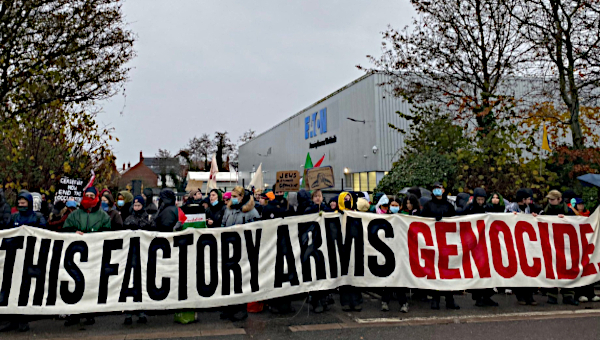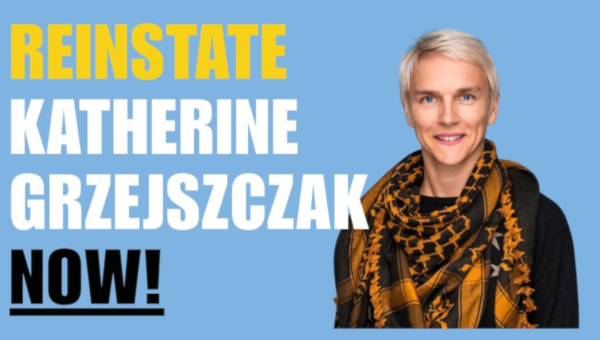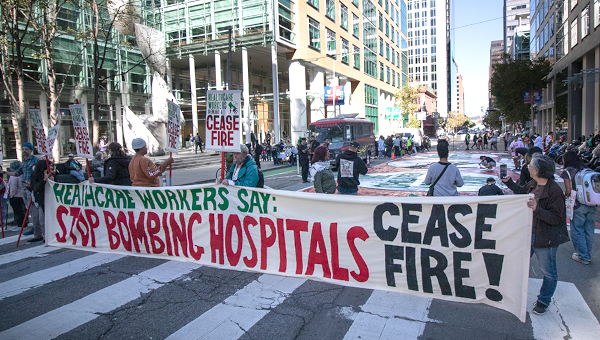How Employers Have Become Part of a Persecution Campaign: The Katherine Grzejszczak case
There are many accounts and criticisms of public-private partnerships (PPP’s) which are created to attain a government’s goal. Governments have internalized a market notion that profit-seeking leads to more efficiency and better outcomes. All too often this is not true. One aspect of these PPP arrangements is that government is expected to hold its private partner responsible for any failure to meet the formally agreed-upon terms. Governments are seen to be responsible to the public for the way in which a PPP is operating and delivering.
There are other arrangements in which governments enter that are not formal but where the governments and other parties have developed symbiotic links that connect them as tightly as any formal contract might. Each of the parties has a role for which it solely is responsible. Their different roles combine to achieve an identified goal. On the face of it, there is a resemblance between this kind of arrangement and a PPP. But it is not a commercial undertaking, and because it is not a formal, legally enforceable arrangement, it makes each of the parties only responsible for the part they play in this informal, unwritten common endeavour. Government is not seen to be responsible for any of the deeds of the other informal partners.
This is how the use of alleged antisemitism has become a legitimate weapon on behalf of those who support Israel in its confrontations with its neighbours. Specific individuals lose jobs and opportunities while all of us lose some of our political rights. These are the outcomes of this informal arrangement between governments, pro-Israel individuals, and organizations and employers who may or may not be pro-Israel. Our governments are not seen as directly responsible for the outcomes of the symbiotic relation they have forged and nurtured.

The Saga of Katherine Grzejszczak
These claims are supported by a recent saga in Ontario. Katherine Grzejszczak had been a paramedic for 15 years when, on 20 June, 2025, she lost her job. There was no warning. She was dismissed for cause, a legal expression which means that the employer claims that the employee has repudiated the obligation she had accepted to abide by the fundamental terms and conditions of the contract of employment. When employees are dismissed for cause, they are not entitled to any notice pay. It is the ultimate weapon in the employer’s arsenal. What had Katherine Grzejszczak done to have her employer so mad at her?
She had spoken her mind. Not at work where she might have upset fellow workers and thereby affected the way work was being done. She had spoken on her own time. She had posted a note on social media with the idea that it would help an anti-war demonstration that her union was supporting. To be anti-war is widely seen as a virtuous value. To promote it by holding a rally of some sort must be seen as an allowable thing to do in a democratic polity. So, how could Katherine Grzejszczak get into trouble?

It was because she picked the wrong war to criticize: the war between Israel and Hamas, which some see as the occupation and ravishing of Gaza. Katherine Grzejszczak criticized the war/occupation in angry tones. It is fair to say that her post argued that Israel’s overwhelming military power means that the war in Gaza is not so much a war as it is a killing field. She used words like genocide1 (as have the bulk of genocide scholars) and murder. This is red meat to pro-Israel individuals and organizations.
Many people might (and do) disagree with Katherine Grzejszczak, but should her opinion and observation not be protected speech in our democracy? The answer to this seems to be that she had used unacceptable language and spoken untruths that frightened and inhibited other people from living freely. They were anti-social, intimidating remarks and, therefore, did not constitute the kind of free speech we want to protect. A series of questions pose themselves.
First, even if it is agreed – and I do not – that Katherine Grzejszczak’s social media posting was not an acceptable exercise of free speech, why should her employer care? Why should the employer think that her passionate commitment to a political cause amounted to a repudiation of her legal and personal commitment to her duties to the employer, that is, being a paramedic who did her best?
An important issue arises at this point. It has become legally accepted that employers assume the right to interfere with their employees’ non-work activities if those activities can be said to affect the employers’ project. The work-for-wages contract imposes a fundamental term of good faith and loyalty on workers and, even outside working hours, employees must be conscious of the fact that they are not to behave in any way that might harm their employers. They must put the employers’ interests above their own.
The class struggle between capital and labour has brought us to a legal situation where the employing class’s scope to discipline workers reaches beyond the workplace. This makes the employing class a valuable partner in the weaponizing of antisemitism.2 Employers can be enforcement agents on behalf of pro-Israel activists and governments that support the pro-Israel activists.
Thus, it was that, when asked to explain the firing, the York Region director of communications, one Patrick Casey, said that the employee’s Facebook comment undermined confidence in public safety and violated York Region’s inclusivity charter. This is a feeble justification. On the face of it, the claim that what a paramedic says on Facebook would undermine the standing of York Region as a trusted deliverer of medical health services is nonsense on stilts. It is the second part of the justification, namely, that Katherine Grzejszczak’s Facebook entry had violated York Region’s inclusivity charter, one that has some, albeit little, bite.
This brings us to the second set of questions. Was her employer reading all its employees’ social media postings to make sure they were not undermining its standing? Obviously not. But the promptness with which the employer acted gives us a hint as to what might have happened. Katherine Grzejszczak posted her controversial message on June 19. Her employer dismissed her on June 20. Unusually efficient. Nick Seebruch reported that someone called Dahlia Kurtz had seen Katherine’s Grzejszczak’s post and had written a rather spiteful note on her own social media outlet. She noted that Grzejszczak was shown as wearing a keffiyeh in her union profile and that that union was evil, as it supported Iran when it was being bombed. She wrote: “I would not trust my life in her hands. Would you feel safe if this paramedic treated you?” We are supposed to understand, instantly, that because one employee hated what Israel was doing and said so, this meant that she hated Jewish people and all Jews should be aware that some paramedics, like the Jew-hating Grzejszczak, would do their job badly should they know they were treating a Jewish person.
It boggles the mind. Yet, this is precisely the kind of outcome our governments, by means of their close-knit, unarticulated, unwritten but firm, bondage with Israel-supporting individuals and groups, signed-up-for in their zeal to protect and support Israel. Here the outcome was the dismissal of a worker involved in politics.
That dismissal came the day after Katherine Grzejszczak’s had posted her opinion on Facebook. It came after a Vaughan City Councillor, Gila Martow had told the mayor of that municipality, Steven del Duca, that there was this alleged hateful message flying around social media. The mayor soon got in touch with the Chair of York region and the rest is history for Katherine Grzejszczak. She was dismissed for cause the day after she had entered her post.
How All This Works
There are people amidst us who feel passionately that Israel should remain viable and secure. This is perfectly acceptable. What is not so acceptable is that they, or at least some of them, should feel free to look for people who hold an opposite view and then seek to have them sanctioned for holding and expressing that view in a non-violent manner. In this case, a woman lost her job. These pro-Israel individuals had engineered the punishment they wanted to inflict on a non-believer. Nick Seebruch noted that the zealous Dahlia Kurtz celebrated the dismissal on her social media: “WE DID IT! The keffiyeh paramedic was fired.”
There is a “we” and the firing, of course, was done by an employer, acting as an employer. And it all was justified by the widely internalized acceptance of a fraught belief that being opposed to Israel makes a person an antisemite. And these zealots believe that incidents of antisemitism must be found and the perpetrators of antisemitic expressions and actions punished. This is justified by invoking the Holocaust: every antisemitic incident is another step on the road to a replay.
The gaps in the reasoning are self-evident. Yet here we are. Faced with a claim that employees are hostile to Israel and, therefore, antisemitic, employers are all too ready to exercise their legal powers. In the case arising out of the grievance that CUPE will bring to have Katherine Grzejszczak’s dismissal set aside on the basis that she had not done anything that harmed her employer by exercising her Charter-protected right to free speech, the arbitrator will be told that antisemitic remarks are not protected because they intimidate and hurt others. No employer could be faulted for dismissing such employees because their standing in the community would be damaged.
Hopefully, in this case, the employer will fail. We will have to wait and see. But, the strong arguments CUPE, Local 905 will have in this case will rarely be available. In the Grzejszczak case, the employer is a governmental entity and the Charter may be invoked. This is not the case in the private sector. The pressure exerted by those who use antisemitism as a weapon will be more effective there.
Here is where we are: individuals and groups supporting Israel watch out, with peculiar enthusiasm, for signs of antisemitism. Once they find it, they act. They exploit their curious definition of antisemitism which transliterates any attack on Israel into an antisemitic attack, so that the slogan “From the river to the sea” is evidence of hatred of Jews, as is the wearing of keffiyeh. They then feel no compunction in pressuring employers into disciplining their employees.
Those who weaponize antisemitism in this way are not embarrassed by the fact that they are engaged in campaigns that, ironically, involve a version of boycotts, divestments, and sanctions. They are telling private employers to not employ specific people, that is, to boycott them, and asking that the employer impose punishment on those they have employed or face being shamed in public and lose some customers which is equivalent to imposing sanctions. There is some irony in this. After all, the same supporters of Israel act fiercely against the well-known Boycott/Divest/Sanctions (BDS) campaigns intended to hurt Israel. This campaign to protect Israel was given a governmental boost by the Harper government in 2015. It declared that it would treat any BDS activity as akin to a violent act, a hate crime.
The pro-Israel proponents’ drive to seek and root out what they deem to be antisemitism got another helping hand in 2016. The International Holocaust Memorial Alliance (IHRA) was formulated and disseminated. It proposed a working definition of antisemitism that included the notion that remarks which, in some way, were critical of the State of Israel and its policies might be considered antisemitic. This dovetailed, as Joshua Leifer wrote in 2019, with Israel’s own pivoting of its propaganda output to ensure that anti-Zionism should be equated with antisemitism. Our federal government and six provincial governments adopted the IHRA as something that should imbue their decision-making. To critics, this signified that freedom of speech in Canada should be read as a right to freedom of speech with a Palestine exception.

To pro-Israel activists, this legitimated their argument that pro-Palestinian/anti-Israel/anti-Zionism actors were antisemitic. It bothered no one that this line of argument was based on a pro-Israel approach by our governments. These governments are acting in support of the individuals and groups that claim they are fighting antisemitism that they persistently argue will lead to another Holocaust. But the Holocaust of which they speak so glibly was impelled by government action, by Hitler’s antisemitic policies. In Canada, the situation is the opposite. The words and actions of fellow citizens who happen to be pro-Palestinian in their views are a far cry from the government propaganda machine and daily dispossessions, cruelties, and displacements by the Hitler government’s policies and legal support for anti-Jewish decrees and judgments. The fact that the Canadian and other governments are on their side makes the argument of the pro-Israel activists illogical.
What is emerging is that our governments provide the pro-Israel activists with the justifications they seek to use their influence to have their pro-Israel/anti-Palestine views re-enforced by pushing the enforcement agents in this informally organized ‘partnership’, employers, to punish employees, dismiss them, refuse to hire some suspected ‘antisemites’, that is, anti-Israel, persons. We have many examples, too many to document here. The October, 2022 scholarly study by Sheryl Nestel and Rowan Gaudet outlines many incidents of harms done to so-called antisemites in Canada; Judy Haiven’s Blog, provides lists of the more egregious outcomes of the weaponization of antisemitism in Canada. Katherine Grzejszczak is a run-of-the-mill case, one among many cases where people lost their jobs, or were not given a job, or were harassed and bullied.
It is plain that, while the logic is faulty, there is a glue that binds governments, pro-Israel activists, and employers together to form a formidable support group for Israel. To be sure that it remains in place, pro-Israel activists and lobby groups work tirelessly on governments to harden the glue. When the Ottawa Holocaust Museum was graffitied (to my knowledge someone had written “Feed Me” on the wall, not antisemitic in any obvious way), all our political leaders were quick to say that they were appalled. Lawrence Greenspon, a lawyer and co-chair of the National Holocaust Monument Committee, understood that this was a simple case of vandalism but that, nevertheless, it pointed to the need to root out the cause of antisemitism in Canada, and this required more action by the government.
More sustained are the efforts by other pro-Israel groups. One example should suffice. The Centre for Israel and Jewish Affairs (CIJA), a non-profit organization, spends considerable efforts to make politicians aware of the need to support the State of Israel and its policies. Davide Mastracci consulted the Public Registry for the Office of the Conflict of Interest and Ethics Commissioner to which members of Parliament must report the subsidies for any trips they have taken. The title of the article he published in The Maple, Nov. 20, 2023, tells us much. “CIJA has taken nearly 25% of MPs on paid trips to ‘Israel’.” At the time, this meant that 73 Parliamentarians had enjoyed a visit to Israel and the West Bank at CIJA’s expense which, Mastracci calculated, was at a cost of $12,257 per MP. Pretty cheap if it bought more allegiance to the Israeli cause that CIJA promotes. CIJA is currently on a roll.
Jean-Luc Beaudry reports that the Manitoba government had announced that it and the federal government were going to partner (a telling word in this context, as they will not be partners in the legal sense) with CIJA to “provide specialized training to Crown attorneys on prosecuting hate crimes.” Beaudry rightly notes that, whatever CIJA might know about hate for Israel or Jews, its expertise on other forms of racism and discrimination, such as the treatment of Indigenous peoples, Black people, Muslims, Asian people, all pressing issues, was not likely to give the CIJA any better understanding of these matters than that of any person who reads a newspaper. It is pretty clear what the Manitoba and federal governments have in mind: they want their prosecutors and police to be more aware of the scourge of antisemitism as understood by outfits like CIJA. More glue to bind governments, pro-Israel activists, and the enforcers, the employing class.
Summation
- Antisemitism is weaponized by pro-Israel activists. They are helped by our governments which see this as useful to their pro-Israel stance.
- The pro-Israel activists justify their zealous monitoring of anti-Israel/pro-Palestinian individuals and groups and the persecution of them on the basis that, if they are against Israel and its policies, they must be antisemites and should be treated as lepers. After all, if antisemitism is allowed to thrive in the population, the next step down the slippery slope will be another Holocaust.
- Our governments actually support Israel and its policies. The claim that the antisemitism attributed to Canadian pro-Palestinian/anti-Zionist militants will lead to a German government-like Holocaust is, to say the least, fraught.
- None of this inhibits those who weaponize antisemitism. They feel justified in pressuring employers to use their power to discipline and punish to deal with pro-Palestine – antisemitic by definition – employees or employees-to-be. Governments, which have provided the platform for this distorted reasoning, are distant from the outcomes, from the harms inflicted by the many employers (including by institutions like universities and research centres which should know better) who are afraid that they, too, will be labelled ‘antisemitic’.
- As an old man who hails from Europe and was alive during World War II and who would be classified as a survivor by those who run the Holocaust Industry, the story is deeply saddening. I am distressed because the invocation of the Holocaust to justify that antisemitism of a very different kind is to be used to still political opposition to a nation’s policies and acts is an abuse. I believe that the Holocaust should be commemorated and memorialized precisely because this will prevent new immoral brutalities, not engender more of them.
- As a labour relations lawyer of long standing, I am depressed by the fact that the working class has not been able to curtail employers from not just having control over their bodies and minds in the workplace but also when they are outside it. Employers are able to enforce the wishes of the pro-Israel forces and thereby curb the citizen rights workers ought to have.
- As a reasonably logical person, I am troubled by how easily the pro-Israel lobby has been able to persuade large numbers of people that criticism of Israel is evidence of antisemitism. The adoption of the IHRA by our governments, without any debate, has a great deal to do with this.
- Canada’s claim that it is a free and democratic nation is an empty claim. Katherine Grzejszczak is just the latest victim of this impoverished democracy. •
Endnotes
- That most people see Israel as committing genocide, see Sondos Asem, “Top genocide scholars unanimous that Israel is committing Genocide in Gaza: Dutch investigation,” Middle East Eye, 17 May, 2025.
- For some of the literature on the havoc created by the weaponization of antisemitism, see, Sheryl Nestel & Rowan Gaudet, “Unveiling the Chilly Climate: The Suppression of Speech on Palestine,” IJV, 2022; Judy Haiven’s blog, Another Ruined Dinner Party; for a non-Canadian analysis, see European Legal Support Center; British Society for Middle Eastern Studies, BRISMES, “Freedom of speech and academic freedom in UK Higher Education: The Adverse Impact of the IHRA definition of antisemitism,” Sept. 2023.





